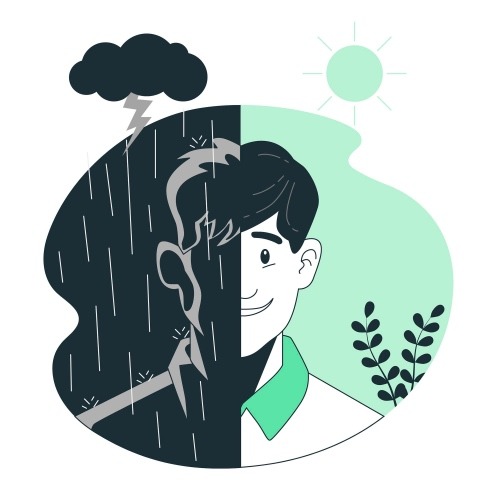









Bipolar Disorder
Also known as manic depression, bipolar disorder is a mental disorder that results in drastic mood changes and energy swings. Such changes and swings range from mania (emotional highs) to downright depression (emotional lows). The prevalence rate of bipolar disorder in this country alone is somewhere between 0.4% and 0.6%, based on an estimation by Relate Malaysia, a local organization that focuses on mental health awareness.
Even though it has a significant chance of lasting throughout someone’s life, bipolar disorder is certainly manageable as long as constant monitoring is provided, such as via bipolar disorder treatment in Malaysia.

Symptoms
Most of the time, those with bipolar disorder experience swift and unpredictable emotional swings. They could stay within one mood spectrum for a while, or switch back and forth between two opposite moods. The symptoms are as follows:
Causes of Bipolar Disorder
It is still quite difficult for researchers, even these days, to exactly pinpoint why does bipolar disorder occur. Nevertheless, there are some possible justifications as to how a person could end up having such a condition, includes:
Additional Risk Factors for Bipolar Disorder
Aside from external or internal factors, people are more prone to bipolar disorder if they suffer from:
Treatment
Experts would recommend specific medications to stabilize the moods of bipolar patients. Various types of psychotherapy can also be carried out to help detect and regulate sudden emotional imbalance. Fortunately, standard bipolar disorder treatment in Malaysia covers all of the above mechanisms.
What does Green Wings Recovery Centre offer patients?
How many specialists are there and what accreditation's have been awarded to Green Wings Recovery Centre?
A psychiatry consultation involves a conversation between you and a psychiatrist to find out what might be wrong and to come up with a management or treatment plan to help with the problem.
Psychiatry is a medical field that deals with the diagnosis, treatment, and prevention of mental health conditions. A doctor who specializes in psychiatry is called a psychiatrist. There are several reasons why someone chooses to have or is referred by their GP to see and consult a psychiatrist. These include:
Worry, fear, and anxiety
Problems adjusting after experiencing stress or major life changes
Depressed
Bad/low mood that does not go away
Thoughts of hurting other people
Suicidal thinking
Hurting themselves on purpose
Being unable to sleep, relax, or wind down
Having too much energy
Obsessional thinking
Constant negative thinking
Feeling jumpy or on edge
Feeling like people want to harm you or after you
Delusions (fixed beliefs with no basis in reality)
Hallucinations (seeing or hearing things that are not actually there)
Memory problems
Disjointed, rushing thoughts
Hyperactivity, poor concentration and attention
Agitation, violence, or emotional outbursts
Out of control drug or alcohol use
Problem gaming, gambling, or other addictive behaviors
Insomnia or other sleep problems
Problems around body image, dieting or eating
Conditions that begins in childhood, such as childhood anxiety, intellectual disability, and autism.
Mental health conditions that may be diagnosed and treated in psychiatry consultations are as follows:
Anxiety
Obsessive-compulsive disorder (OCD)
Depression and bipolar disorder
Phobias
Personality disorders
Paranoia and schizophrenia
Dementia and Alzheimer’s disease
Sleep disorders, such as insomnia
Eating disorders, such as bulimia and anorexia
Addictions, such as alcohol and drug misuse.
Psychiatry consultation is usually needed for people with long-term, terminal, or painful physical health conditions to provide psychological support as well.
No recovery time is needed after the psychiatry consultation itself. You should be allowed to go back to your normal activities, including work and exercise, immediately after your treatment. Note that it is normal to feel emotionally drained or overwhelmed after a psychiatry consultation. Therefore, it is okay to rest after your consultation and return to your daily activities when you feel ready.
Your recovery will start after treatment, which will depend on your specific condition and the type of treatment you undergo.
Psychiatry consultation is the first step of treatment for mental health conditions. Consultations have high success rates in diagnosing your condition and finding out the reason for your problems. There is typically no risks involved in psychiatric consultations. Discussing your past, problems, family history, and treatment goals can bring up sensitive issues that may cause you to feel a lot of emotions.




Bipolar Disorder
Also known as manic depression, bipolar disorder is a mental disorder that results in drastic mood changes and energy swings. Such changes and swings range from mania (emotional highs) to downright depression (emotional lows). The prevalence rate of bipolar disorder in this country alone is somewhere between 0.4% and 0.6%, based on an estimation by Relate Malaysia, a local organization that focuses on mental health awareness.
Even though it has a significant chance of lasting throughout someone’s life, bipolar disorder is certainly manageable as long as constant monitoring is provided, such as via bipolar disorder treatment in Malaysia.

Symptoms
Most of the time, those with bipolar disorder experience swift and unpredictable emotional swings. They could stay within one mood spectrum for a while, or switch back and forth between two opposite moods. The symptoms are as follows:
Causes of Bipolar Disorder
It is still quite difficult for researchers, even these days, to exactly pinpoint why does bipolar disorder occur. Nevertheless, there are some possible justifications as to how a person could end up having such a condition, includes:
Additional Risk Factors for Bipolar Disorder
Aside from external or internal factors, people are more prone to bipolar disorder if they suffer from:
Treatment
Experts would recommend specific medications to stabilize the moods of bipolar patients. Various types of psychotherapy can also be carried out to help detect and regulate sudden emotional imbalance. Fortunately, standard bipolar disorder treatment in Malaysia covers all of the above mechanisms.
What does Green Wings Recovery Centre offer patients?
How many specialists are there and what accreditation's have been awarded to Green Wings Recovery Centre?








Bipolar Disorder
Also known as manic depression, bipolar disorder is a mental disorder that results in drastic mood changes and energy swings. Such changes and swings range from mania (emotional highs) to downright depression (emotional lows). The prevalence rate of bipolar disorder in this country alone is somewhere between 0.4% and 0.6%, based on an estimation by Relate Malaysia, a local organization that focuses on mental health awareness.
Even though it has a significant chance of lasting throughout someone’s life, bipolar disorder is certainly manageable as long as constant monitoring is provided, such as via bipolar disorder treatment in Malaysia.

Symptoms
Most of the time, those with bipolar disorder experience swift and unpredictable emotional swings. They could stay within one mood spectrum for a while, or switch back and forth between two opposite moods. The symptoms are as follows:
Causes of Bipolar Disorder
It is still quite difficult for researchers, even these days, to exactly pinpoint why does bipolar disorder occur. Nevertheless, there are some possible justifications as to how a person could end up having such a condition, includes:
Additional Risk Factors for Bipolar Disorder
Aside from external or internal factors, people are more prone to bipolar disorder if they suffer from:
Treatment
Experts would recommend specific medications to stabilize the moods of bipolar patients. Various types of psychotherapy can also be carried out to help detect and regulate sudden emotional imbalance. Fortunately, standard bipolar disorder treatment in Malaysia covers all of the above mechanisms.
What does Green Wings Recovery Centre offer patients?
How many specialists are there and what accreditation's have been awarded to Green Wings Recovery Centre?
CONTACT SUCCESSFUL